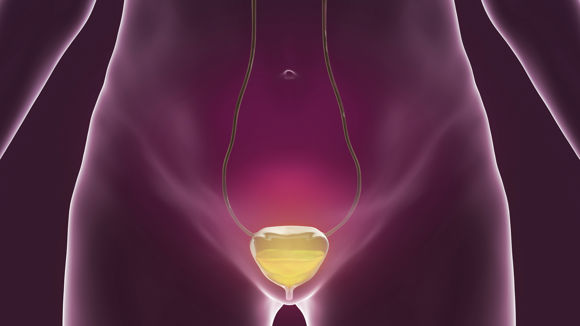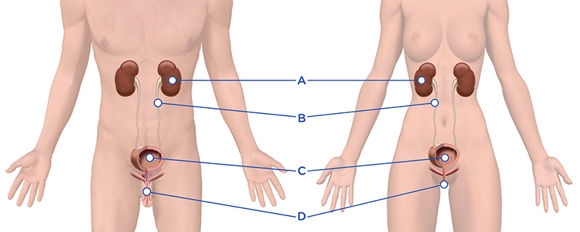
What is Diabetes?
Diabetes mellitus, often simply referred to as diabetes, is a group of metabolic diseases in which a person has high blood sugar, either because the body does not produce enough insulin or because cells do not respond to the insulin that is produced.
Effect of Diabetes on the Bladder and Bowel
Diabetes may increase the risk of complications in different parts of the body. One common complication is neuropathy, which means that nerves have become damaged, resulting in loss of sensation. This usually begins in the longest nerves and therefore affects feet first.
Diabetes neuropathy can develop anytime, but the longer you have had diabetes, the more likely it is that nerves are affected. The nerve damage may end up affecting your bladder and bowel function. This can go unnoticed for a long time and therefore treatment is commonly offered late.
Diabetes and Bladder Symptoms
The effect of neuropathy on the bladder consists of a triad of changes. First of all, a reduction of sensitivity in the bladder. This basically means that you will not sense bladder filling in the same way, resulting in infrequent visits to the toilet.
Secondly, as a consequence of this, bladder volumes will increase – since you will not sense/notice that you need to urinate.
Thirdly, you will have impaired contraction ability of the bladder – making it impossible to empty your bladder completely. This results in retention, urinary tract infections, incontinence (sometimes signs of overactivity), and in the long run, an increased risk of kidney failure.
These changes lead to an enlarged and underactive bladder, that initially does not present very many symptoms, but when the sphincter (the muscle that controls your bladder's ability to empty) also becomes affected, it can lead to urinary retention, incontinence, and repeated urinary tract infections. Some people also have bladder weakness, with painful chronic urinary retention.
Click here to request a free catheter sample
Diabetes and Bowel Symptoms
Constipation is quite common in people with diabetes. The cause may be either due to nerve damage caused by high blood sugar or caused by medications to control the disease.
The effect of neuropathy on the bowel is mainly related to the transit time of bowel content. Neuropathy can slow down the transit of the bowel content, which in turn gives more time for absorption of water and can result in harder stool that is more difficult to pass. This causes constipation that in turn can result in fecal impaction, a hard lump of stool blocking the bowel, if not treated.
On the other hand, neuropathy can also cause too fast bowel movements, which will cause problems with the absorption of fluid from the bowel content. This can result in a more watery stool, more frequent and urgent bowel movements, or even diarrhea.
What to Look For if you Have Diabetes
Since the bladder symptoms may be subtle you may not notice much, to begin with at all. A quick self-check may offer some clues:
- How often do you go to the toilet with the purpose to empty your bladder? Less than 4 times per day?
- Do you feel that you need to strain to empty your bladder?
- Do you feel like your bladder is not emptied?
- Have you had several urinary tract infections in the past year?
If yes, to any of these questions – a checkup may be of value. The same goes if you have any other bothersome symptoms from your urinary tract or from your bowel. You can find more information about bowel function here. Fill out the bowel questionnaire and bring it to your healthcare professional for discussion.
Resources
The International Diabetes Federation is an umbrella organization for 230 national diabetes organizations across 170 countries. Their mission is to educate, raise awareness, guide and support those impacted by the disease.
-
Bladder and Bowel Dysfunction
What is bladder and bowel dysfunction and how do they correlate with each other? In a lot of cases, bladder and bowel symptoms coexist side by side and interact. Here we explore why.

-
Treatment Options for Bladder Problems
In this section, we explore the treatment options available for bladder problems, one of which is catheters. Learn about the different types of catheters and how they are used.

-
Living with Bladder Problems
To live with a condition that requires you to catheterize on a regular basis may feel overwhelming in the beginning. Find comfort in the fact that you are not alone.

For Healthcare Professionals
-
Long-term safety of intermittent catheterization
key:global.content-type: Article
Single-use hydrophilic catheters were developed in the early eighties to address long-term complications of intermittent catheterization that came about when people reused plastic catheters with add-on lubrication.

-
Urinary system dysfunctions
key:global.content-type: Article
Illness, aging or injury, can lead to loss of bladder control by impacting the bladder’s ability to store and empty urine.

-
Urinary system
key:global.content-type: Article
The urinary system is responsible for the eliminating of waste and extra fluid in the body, by making and excreting urine.
